China Power: As Beijing plays up global peacemaker role, scepticism lingers in Southeast Asia
In an ongoing series on China’s regional influence, CNA examines how the country’s global peacemaker pursuits - from Ukraine to Gaza and Myanmar - are reshaping its standing in Southeast Asia.
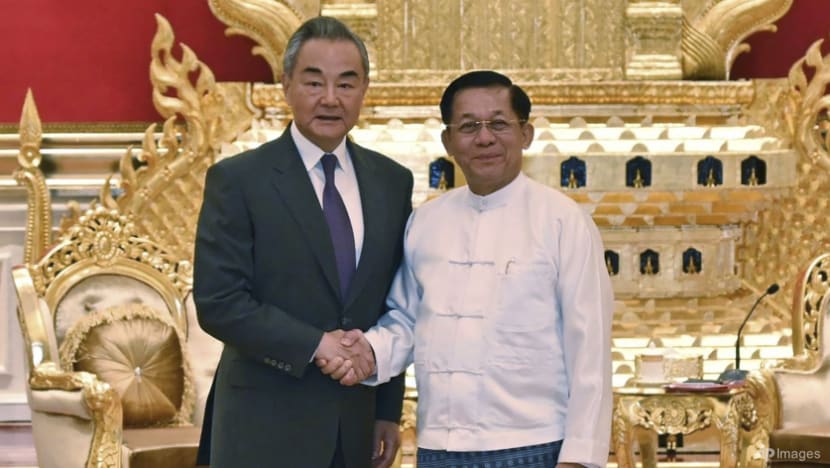

This audio is generated by an AI tool.
JOHOR/MANILA/SINGAPORE: Until recently, Muhammad Umar Bakhthiar had a negative view of China as a conflict instigator and “troublemaker”.
The 52-year-old Malaysian, who works in a mosque in Malaysia’s Johor state, admitted that many of his friends and family perceived China to be a “greedy country” that would take what it wanted with little regard to the sovereignty of others.
The reason: China’s perceived aggression in expanding its borders in areas like the South China Sea, as well as its actions on issues like Taiwan and Tibet, Muhammad Umar, who grew up in a rural conservative village in northern Malaysia, told CNA in a phone interview.
But the 52-year-old’s views have shifted in favour towards China over the past year, particularly following the superpower’s efforts to promote peace in the Gaza conflict.
Indeed, analysts say China has reaped some gains to its reputation through its drive to cast itself as a global peacemaker, mediating conflicts from the Middle East to Ukraine.
But its concurrent actions in regional flashpoints like the South China Sea have also raised eyebrows and scepticism over perceived contradictions to its peacemaker rhetoric.
“China’s mediation is seen as a strategic move to enhance its global influence rather than a genuine effort to resolve conflicts. Its effectiveness is often questioned due to limited tangible outcomes,” Associate Professor Jonathan Ping from Bond University, who specialises in China studies, told CNA.
The latest State of Southeast Asia survey by Singapore’s ISEAS-Yusof Ishak Institute highlights persistent scepticism in Southeast Asia toward China’s global leadership, even as countries view it as the most influential economic and political-strategic power in the region.
Just slightly over 10 per cent of the 2,000-plus ASEAN respondents canvassed in the annual poll perceive China as a leader in maintaining the rules-based order.
In contrast, 26.5 per cent of them selected the US. “The US continues to be perceived as the leading actor in maintaining the rules-based order and upholding international law,” the report noted.
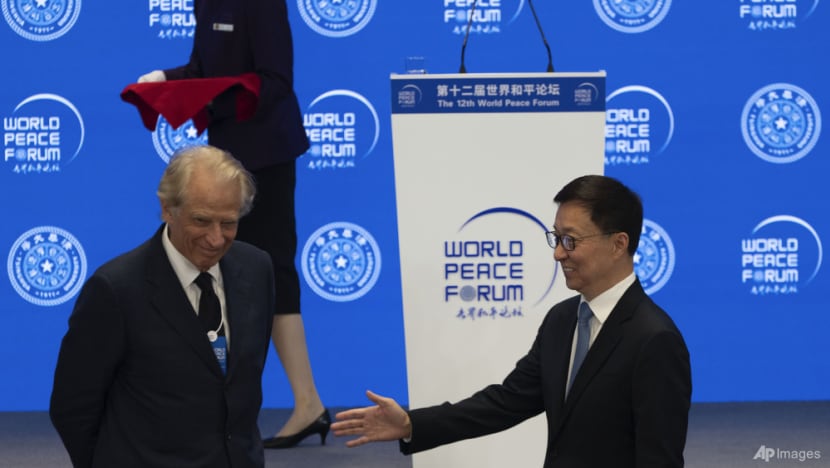
“Despite concerns over President Trump’s transactional approach and the US’ withdrawal from international organisations, (ASEAN) respondents continue to see the US as a key defender of global governance.”
Regional confidence that China will “do the right thing” to contribute to
global peace, security, prosperity, and governance rose to 36.6 per cent, a near-12 percentage-point increase from the previous year.
PEACEMAKER OR POWER PLAYER?
China has in recent years actively positioned itself as a global mediator, distinct from US influence.
In its own backyard, Asia, Beijing has been vocal about trying to promote peace and dialogue in Myanmar, where a raging civil war - now in its fifth year - has exposed regional divisions. In January, China brokered a ceasefire between the junta and a major ethnic rebel group.
In Europe, China’s firm gaze has been on the Russia-Ukraine war, putting forth a 12-point peace proposal on the conflict in February 2023.
More recently this year, Chinese officials reportedly surfaced the idea of holding a Trump-Putin summit as both leaders signalled their intent to enter negotiations to end the grinding war, the Washington Post reported citing sources.
Further afield in the Middle East, China has also trained its sights on helping to attain a measure of peace in war-torn Gaza - brokering a Palestinian unity deal in July 2024.
In arguably its most fruitful endeavour, China brokered a historic reconciliation between Saudi Arabia and Iran in 2023. Beijing mediated the landmark rapprochement alongside Iraq and Oman without direct involvement from the US or Europe.
China now has an opportunity to step in as the Trump 2.0 administration adopts unilateralism and protectionism, noted Alejandro Reyes, a senior fellow at the University of Hong Kong’s Centre on Contemporary China and the World.
"The US has taken an increasingly adversarial stance toward its allies and partners, prompting these nations to seek alternative major powers to engage with, and there’s China,” he told CNA.
China is also leveraging its strength as a global economic superpower to help broker peace across different global conflicts, Filipino security analyst Rommel Banlaoi told CNA.
He added that Beijing also has ties with nations with nuclear capabilities like North Korea and is hence better positioned to engage them through talks.
“China is making a lot of efforts to maintain international peace and security, which runs counter to the actions of the United States. The US is funding the war in Ukraine, funding the war against Hamas (in Gaza), and is antagonistic against the likes of Iran and North Korea,” said Banlaoi.
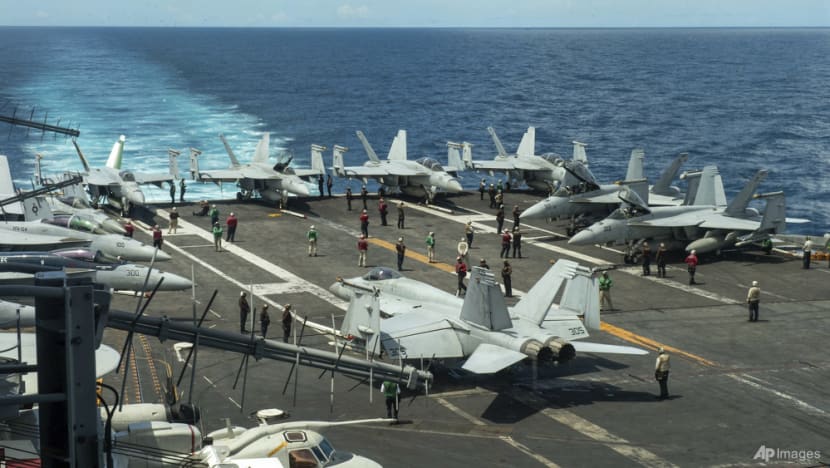
It’s a contrast that China has been eager to play up.
During China’s Two Sessions in March, Chinese Foreign Minister Wang Yi underscored the principles guiding major powers and their global responsibilities.
He cautioned that if powerful nations operate on a “might is right” basis, it would undermine the world order and lead to a survival-of-the-fittest scenario, where smaller and weaker countries bear the consequences.
“Major powers should shoulder international responsibilities and fulfill their global commitments. They should not be driven solely by self-interest, nor should they bully the weak with their strength,” he said.
VARYING DEGREES OF REGIONAL APPRECIATION
But China’s peacemaker pursuits on the global stage have been met with varying degrees of appreciation among some Southeast Asian states, analysts note.
On the Israel-Hamas war, China has highlighted its differences from the US, which it accuses of fuelling tensions through its support for Israel, said James Dorsey, an adjunct senior fellow at Singapore-based think tank S Rajaratnam School of International Studies (RSIS).
China has positioned itself as a supporter of Palestinian rights, reiterating its longstanding backing for a two-state solution while criticising Israeli military actions in Gaza.
China has also framed the conflict as a consequence of broader instability, attributing tensions to what it describes as historical injustices against Palestinians. Chinese officials have urged the United Nations and the international community to play a more active role in mediation while avoiding direct condemnation of Hamas.
This stance has resonated with segments of the Global South, including Muslim-majority Southeast Asian nations like Malaysia and Indonesia, bolstering China’s broader diplomatic strategy of aligning with developing countries, Dorsey noted.
“Both Malaysia and Indonesia have been openly supportive of Palestinians … China’s stance, as opposed to the US, strikes a chord with them.”
This is further reinforced by the fact that neither the current nor previous US administrations have made favourable impressions, pointed out Abdul Rahman Yaacob, a research fellow in the Southeast Asia programme at the Lowy Institute think tank.
“The Biden administration has damaged Washington's image as an honest peace broker because of its failure to stop the conflict in Gaza,” he said.
“(And) now, Trump's coercive approach to foreign policy is causing more damage to Washington’s image, and (this) places China in a more favourable light.”
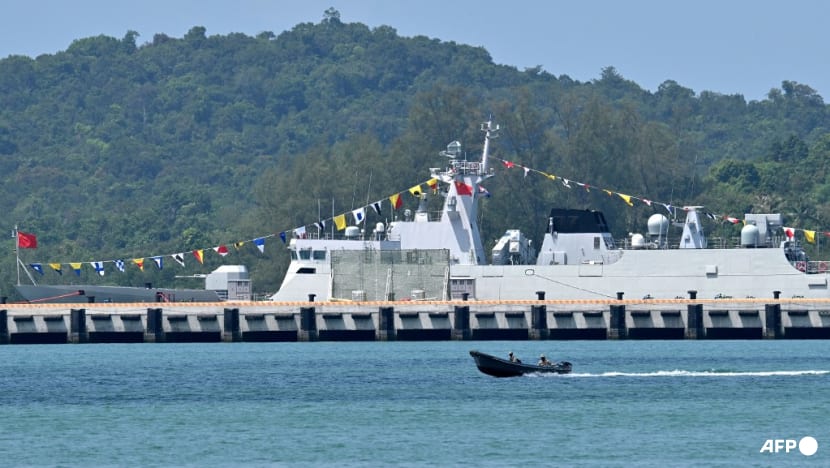
On the ground, the latest developments and China’s peacemaking efforts are making an impact.
Muhammad Umar, the Malaysian who works in a mosque, said that he has warmed to Beijing’s style of negotiating for peace in the Gaza strip in comparison with the US, which he said had helped “fund war” by giving military aid to Israel.
“Many Malaysian Muslims did not have a good perception of China because of various issues, including … the dispute over (islands) in the South China Sea,” he said.
But over the last year, they have condemned Israel - they are among the small number of (superpowers) who did this,” he added.
“There are still some concerns with China … but I think seeing how they have handled the Gaza issue alone, one can say they are the superpower advocating for peace.”
Azmi Hassan, a senior fellow at the Malaysia-based think-tank Nusantara Academy for Strategic Research, told CNA that China’s vocal stance on the Gaza conflict in particular has shifted its image among many Muslims in Malaysia, Indonesia and the Middle East.
“China is the more neutral superpower, and it is also opening up not only in the economic sense but also in geopolitics. Bilateral ties between China and Malaysia have also been warmer than they have ever been,” he added.
Azmi further cited China’s role in the Iran-Saudi Arabia detente in 2023 as a clear example of how it has embraced its role as a global peacemaker.
He said that since then, Beijing has been increasingly perceived by many Muslims as a peacemaker while viewing the US, on the other hand, as an “instigator of conflicts”.
Azmi cited US President Donald Trump’s recent brazen comments to take over Gaza and relocate Palestinians from the war-torn enclave as possibly tipping the scales in leading Muslims in Southeast Asia to back China over the US.
“These comments from Trump could cause the US to lose their influence in the region. Increasingly, they are being perceived as a superpower that mainly acts on self-interest,” he added.
The Iran-Saudi Arabia rapprochement was a major diplomatic feat given the longstanding hostility between Tehran and Riyadh, noted the Lowy Institute’s Abdul Rahman.
Chinese state media lauded Beijing’s role in bringing it to pass.
The state-run Global Times hailed it as a “best practice” of the Global Security Initiative. It called the deal a “milestone in easing Middle East tensions and bringing stability to a volatile geopolitical landscape”.
China's Global Security Initiative is a framework promoting cooperative security, multilateralism, and non-interference, aimed at addressing global conflicts through dialogue rather than confrontation, according to official statements.
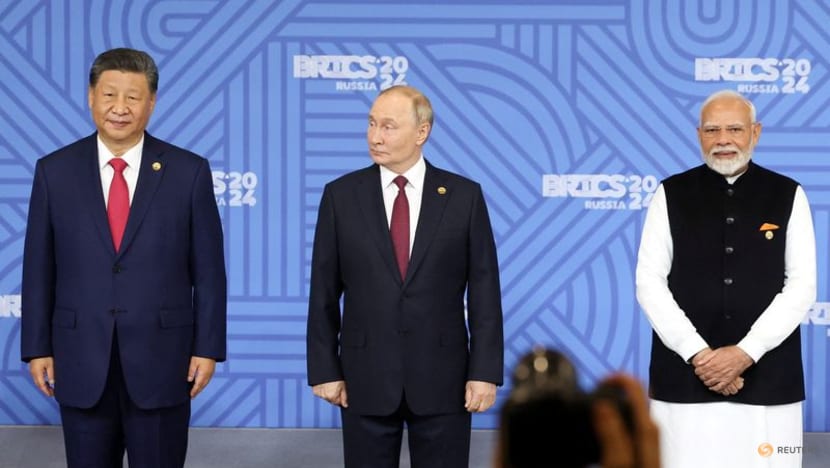
LINGERING SCEPTICISM
Despite China’s mediation milestones and rhetoric on peaceful development and non-hegemonic intent, observers say many in Southeast Asia remain sceptical of the country’s leadership in upholding the rules-based international order.
Most members of the Association of Southeast Asian Nations (ASEAN) are taking a “wait and see” approach, gauging whether China genuinely upholds its pledge to be a "benign" superpower committed to facilitating global peace, said Reyes from HKU.
A key factor is China’s growing assertiveness in the region, particularly in the South China Sea, which has raised questions over Beijing’s long-term agenda.
Aggressive behaviour in the South China Sea is the top geopolitical concern for the region, overtaking the Israel-Hamas conflict, according to the latest State of Southeast Asia report.
Close to half (48 per cent) of the ASEAN survey respondents cited “China's encroachments in the exclusive economic zones and continental shelves of Southeast Asia's littoral states” to be most worrying.
Another 44.3 per cent of this group believe that an accidental conflict between an ASEAN member state and China could result in a political crisis.
China claims almost all of the South China Sea, rejecting an international ruling that states most of its claims have no legal basis. Its expansive claims overlap with those of Southeast Asian nations such as the Philippines, Malaysia and Vietnam.
Satellite imagery in recent years has captured China's expanding land reclamation efforts in the South China Sea.
Beyond piling sand onto reefs, China has built ports, military installations, and airstrips - most notably in the Paracel and Spratly Islands, where it maintains 20 and seven outposts respectively, according to research by the Council on Foreign Relations' Center for Preventive Action programme.
China’s military assertiveness in the South China Sea is widely viewed as a security concern, said Abdul Rahman from the Lowy Institute. “(This is) particularly due to its aggressive actions that contradict its image as a peacemaker.”
Abdul Rahman shared that in his conversations with officials from several countries in the region, Chinese military and non-military vessels have often been described as confrontational.
"Many of these incidents have not been made public, as these nations prefer to maintain diplomatic engagement with China to address the South China Sea disputes," he noted.
Bucking this trend is the Philippines. The country has in recent years been publicising its naval run-ins with China in the West Philippine Sea, referring to its exclusive economic zone in parts of the South China Sea.
Footage released by Manila has shown Philippine boats being blasted by high-pressure water cannon, inflatable crafts getting punctured and lasers being pointed at navy officers.
On its end, Beijing has accused the Philippine Coast Guard of ramming its ships and instigating the collisions.
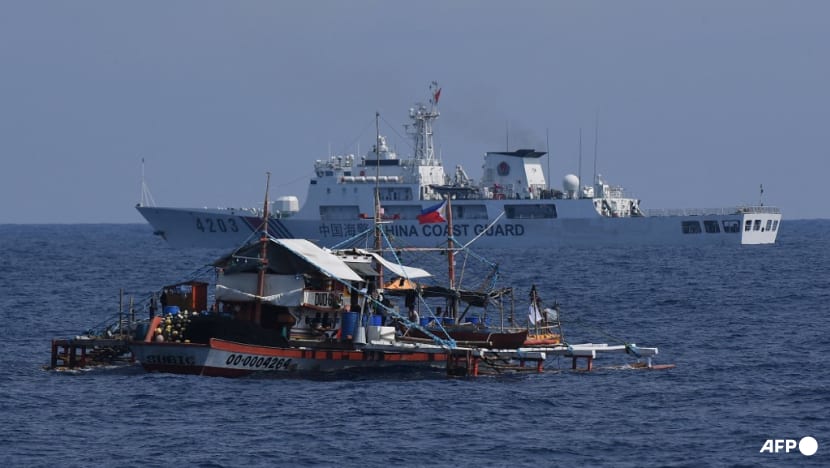
Commodore Jay Tarriela, a spokesperson for the Philippine Coast Guard, told CNA that these confrontations have intensified in recent months, inflicting damage on vessels and injuring navy personnel.
“We should be able to make sure that we (the Philippines) are not going to be the reason for the escalation. We should still maintain our temper despite the bullying and harassment of the Chinese Coast Guard,” said Tarriela.
He dismissed the notion that China is a peacemaker as a “false pretence”, labelling it “propaganda” by Beijing.
“The mere fact that you are violating international law because you have the capability to do so - because your vessels are bigger than ASEAN vessels - (is contrary to the view) that you are a peacemaker,” asserted Tarriela.
“It just goes to show that you are a troublemaker, you are a bully, and … you are the one that is endangering the global order,” he added.
China’s conflict mediation in war-ravaged Myanmar has also stoked some concerns that such actions could impinge on the national sovereignty of states.
Amara Thiha, a researcher at Peace Research Institute Oslo, told CNA that China has become the “most influential external mediator in Myanmar’s peace process” as it attempts to broker talks between the junta and ethnic armed organisations.
On one hand, Thiha highlighted China’s capacity to exert meaningful pressure on stakeholders. He referenced how recent negotiations involving the Myanmar National Democratic Alliance Army (MNDAA) and the military government led to the peaceful handover of Lashio to the junta.
On the other hand, China’s intervention does raise concerns on the junta’s control over Myanmar, Thiha acknowledged.
“The central administration is at its weakest in decades, and large parts of the country are contested by various armed groups,” he pointed out.
“In such conditions, sovereignty does not function in the same way it does in a consolidated state. When there are power vacuums, external actors inevitably become more influential - whether that’s China, Western countries, or others.”
Yun Sun, senior fellow and director of the China programme and co-director of the East Asia programme at the Stimson Center, a think tank based in Washington DC, told CNA that Beijing’s immediate objective as mediator in Myanmar is for a ceasefire and not peace.
She explained that peace would require agreements about power sharing and the future political structure. This would be more complicated to attain compared to a ceasefire, which is a temporary arrangement to halt the killings and fighting.
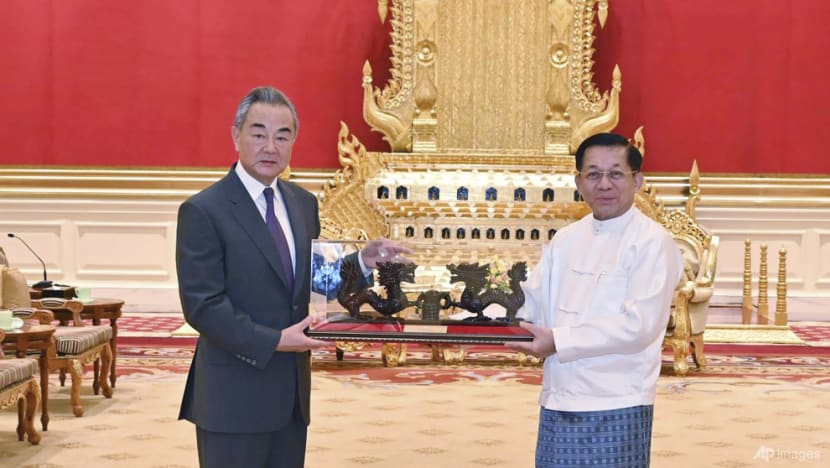
Yun also acknowledged that China’s involvement as mediator does impact Myanmar’s sovereignty. However, she said this is “not unprovoked” as the impact of the conflict has been felt in areas near their land border.
“One thing that you have always heard the Chinese say is that we don't want to get involved in the Burmese national sovereignty or Burmese internal affairs,” she noted.
“But when your internal affairs lead to the bombing of Chinese territory, or leading to 30,000 refugees coming into China, your internal affairs become my internal affairs. And that unfortunately gives China some legitimate justification to play a mediating role.”
As China's international mediator drive continues apace, such regional reservations could negatively impact Southeast Asia's perception of the country - a point which Beijing is likely well aware of.
Southeast Asian nations recognise China as a key economic partner while also maintaining a measured approach toward its broader regional engagement, including its role in promoting stability, analysts point out.
They add that this can place some nations in a delicate position.
Abdul Rahman from the Lowy Institute pointed to Malaysia as an example. With China its largest trading partner for 16 straight years, Malaysia must carefully navigate the economic benefits alongside its security considerations, he said.
"China is seen as an economic partner to work with," said Abdul Rahman.
"However, there are views among senior Malaysian government officials that Western powers are crucial for balancing against China."
“My sense from my engagements with different Malaysian officials is that, if China takes a more aggressive stance on the ground against Malaysia in the waters off Sabah and Sarawak, it may push the Malaysians to take a harder stance against China.”
Either way, with a rising China here to stay and vying with the US for influence in the region, analysts say that Southeast Asian countries - notwithstanding their reservations - will strive to work as best they can with Beijing, and Washington as well.
For example, Dorsey from RSIS pointed out how Malaysia and Indonesia are relatively less dependent on the US for security matters.
“However, they still want the US to maintain a presence. While they may prefer it to be offshore, they don’t want Washington to withdraw entirely,” he said.
“What I’m saying is that most countries, including Southeast Asian nations, will strive to avoid having to make this a binary choice."
The State of Southeast Asia 2025 report saw the US dislodging China to become the prevailing choice (52.3 per cent) if the region were forced to take a side.
China as a choice dropped to 47.7 per cent, down from 50.5 per cent in the previous year where it also emerged tops for the first time.
At the same time, a majority of ASEAN respondents (53.2 per cent) believe that the regional bloc should enhance its resilience and unity to fend off pressures from the two global powers.
Nearly 30 per cent of respondents expressed concern that ASEAN could become an arena for major power competition, with its member states possibly becoming major power proxies.
"Long-term, China’s reputation will depend on its ability to address regional apprehensions and foster genuine partnerships," said Ping from Bond University.
"Increased pushback is possible if China fails to align its actions with regional expectations."
REAPING REGIONAL GAINS
Analysts note that China could reap significant gains in the region should it play its cards right as the US under Donald Trump roils the international order with his unilateral and expansionist rhetoric.
Trump has all but frozen US international aid, pulled the country out of global outfits like the World Health Organization, and trotted out territorial claims over Greenland, Canada and the Panama Canal.
In the case of the Panama Canal, the businessman-turned-president has vowed to take back the waterway and has reportedly asked for military options to be drawn up in order to enhance American access.
Trump has also announced tariffs on some of the US’ closest trading partners like Canada and Mexico, while rolling out sweeping baseline “reciprocal” duties of 10 per cent to purportedly level the trade playing field.
Items from dozens of trading partners - including the European Union and China - that the White House has described as the “worst offenders” face higher rates.
Announcing the bombshell move on Apr 2 in what he dubbed as “Liberation Day”, Trump claimed the US had long been “looted, pillaged, raped and plundered” by other nations.
"Today we are standing up for the American worker and we are finally putting America first.”
Trump's approach to foreign and economic policy sets the stage for Washington to be perceived as a hostile, unreliable partner, as opposed to a more stable and reliable Beijing that one can work with, said Abdul Rahman from the Lowy Institute.
“If China plays its cards correctly and does not engage in aggressive acts against regional countries, especially in the South China Sea, it will be able to gain more influence across the region at the expense of the US.”
LIMITED PEACEMAKING PROGRESS?
China’s global peacemaker drive, while played up by Beijing, has also reaped uneven results, analysts note - a point that Southeast Asian countries are likely well aware of.
RSIS’ Dorsey argues that a closer examination of the Iran-Saudi Arabia agreement suggests China had a “minimal” role in brokering the pact.
“People point to the Saudi-Iran agreement. However, China didn't negotiate that agreement (alone),” he said, noting that Iraq and Oman hosted multiple rounds of dialogue between Riyadh and Tehran in 2021 and 2022, laying the groundwork for the eventual restoration of diplomatic ties.
“(Those) Middle Eastern parties are willing to (lend the deal) to service China's image as a mediator because it suits their purpose. (But) that doesn't necessarily make China a mediator.”
China has seen “little to no progress” in mediation efforts in conflicts such as the Gaza crisis, said Ping from Bond University.
In July last year, Palestinian factions - including longtime rivals Hamas and Fatah - signed a “national unity” agreement. Finalised in China after three days of intensive talks, the deal establishes the framework for an interim Palestinian government to administer post-war Gaza.
However, the pact was swiftly rejected by the US and Israel, which refused to recognise any Palestinian government that includes Hamas unless it explicitly acknowledges Israel - a key sticking point that has derailed previous unity efforts, alongside internal factional rivalries.
Some observers have also raised doubts about the agreement’s effectiveness.
In a research paper published in August last year, Galia Lavi from Israel’s Institute for National Security Studies noted the "low level of representatives from the factions at the meetings held", questioning the depth of commitment to the deal.
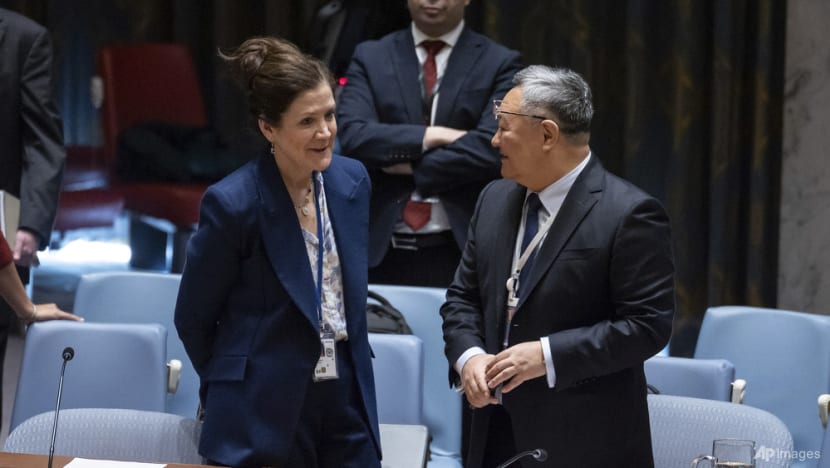
Limited peacemaking progress aside, China’s reputation is also at stake if its influence is perceived as expanding through overt coercion or seemingly advantageous strategies that come with hidden risks, said Wu Se-chih, director of Taiwan Thinktank's China Research Center.
“China’s Belt and Road Initiative (BRI), for instance, has contributed to debt crises in weaker nations, raising concerns about sovereignty risks during financial distress,” he told CNA.
Laos' growing debt to China has drawn scrutiny, given its status as a major beneficiary of the BRI, China’s flagship global infrastructure development programme.
According to Bloomberg data, China is Laos’ largest creditor, holding nearly half of the country's US$10.5 billion external government debt.
The news outlet’s data also shows that as of last year, Laos’ total public and publicly guaranteed debt reached US$13.8 billion - equivalent to 108 per cent of its gross domestic product.
“If China positions itself as a strong and responsible global player, such actions expose certain contradictions in its approach,” said Wu.



















